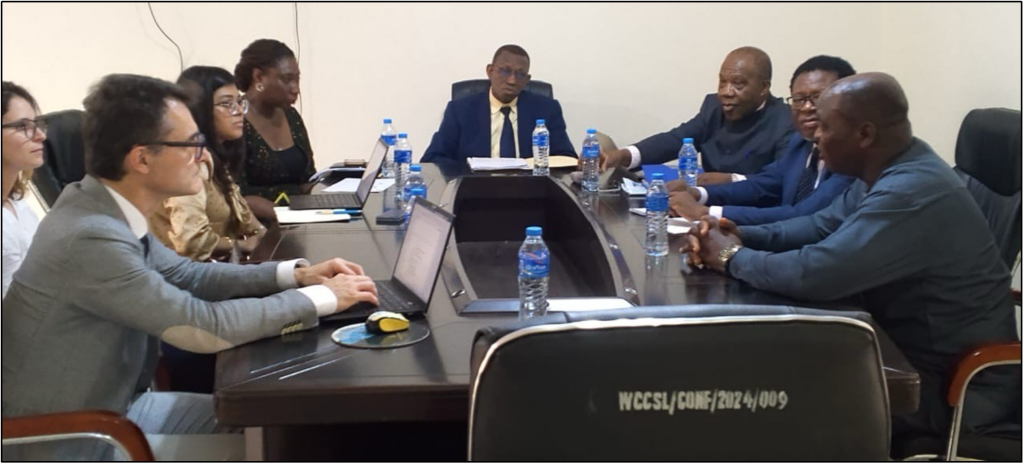The Wages and Compensation Commission (WCC) of Sierra Leone convened an important meeting with a delegation from the International Monetary Fund (IMF) today at their newly established office located at 19F Bath Street, Brookfields. The primary aim of this gathering was to foster a deeper understanding of the challenges associated with harmonizing pay scales and salaries within the public sector, as well as to outline the WCC’s strategic plans for implementing necessary reforms.
Chairman of the WCC, Hon. Alpha Osman Timbo, warmly welcomed the IMF representatives and expressed gratitude for the ongoing collaboration between the IMF and the Sierra Leonean government. He emphasized the pivotal role the WCC plays as a newly formed institution established by an Act of Parliament, tasked with addressing long-standing disparities in the public service wage structure. Timbo stated, “WCC considers the role of the IMF to be critical, and we view them as potential permanent partners in our mission to fulfil our mandate effectively.”
The Chairman also acknowledged the invaluable support provided by the Ministry of Finance and the Accountant General, noting that their unwavering commitment has been instrumental in overcoming initial challenges faced by the Commission. He underscored the importance of collaboration among these entities to ensure the success of the WCC.
In her remarks, Dr. Ilara Mahdi, the Deputy Director of Budget at the Ministry of Finance, outlined the ministry’s strategy aimed at achieving a sustainable wage bill over the medium term. She highlighted the identification of significant challenges, particularly the disparities present in various pay structures. “The ministry has been closely monitoring the WCC, as they possess the legal authority to tackle these pressing issues,” she stated.
Paolo Dudine, the head of the IMF delegation and a Senior Economist at the Fiscal Affairs Department, elaborated on the purpose of their visit. He explained that the IMF team is in Sierra Leone to provide direct support to the Ministry of Finance in evaluating the potential impacts on the Wage Bill stemming from various actions identified in the ministry’s management strategy. Dudine noted the dual pressures faced by the budget: the constraints of financing and the pressing developmental needs that require adequate service provision.
“These two competing forces create a tension between the need for improved efficiency and the necessity of preventing financial leakages,” he remarked. While the IMF’s focus will largely be on financing constraints, Dudine acknowledged that they would not delve deeply into public service efficiency structures, as that falls outside their mandate. Instead, they aim to identify potential savings from actions that have yet to be detailed.
Dudine referenced several countries, including Ghana, Burundi, Mozambique, and Chile, which have successfully undergone pay scheme harmonization. Drawing from these examples, he expressed hope that the WCC could learn from the diverse paths taken by these nations and the varying consequences of their approaches.
He explained that in some cases, harmonization of the wage bill led to increases of up to 1% of GDP. In other instances, such harmonization was accompanied by additional reforms that enhanced efficiency and improved public financial management, ultimately aiding in the overall financial impact. “Our goal is to provide the WCC with a range of data to aid in their decision-making process,” Dudine stated.
During the meeting, the Chief Executive Officer of the WCC, Mr. David W.S. Banya, presented the Commission’s initiatives aimed at reforming the public sector to enhance efficiency and effectiveness in service delivery. He articulated the reform objectives, which include transforming the public sector into a more accountable and inclusive entity that can support sustainable development. Banya expressed that these reforms are intended to build public trust, stimulate economic growth, and improve the quality of services offered to citizens.
He highlighted the WCC’s mandate to determine the wages and compensation for public sector employees, ensuring that the pay system reflects principles of equity and merit. Banya also shared insights into the Commission’s key achievements and the challenges it has encountered since its inception, urging the IMF to continue providing support in any capacity it can.
The meeting was attended by notable figures, including the Deputy CEO of WCC, Mr Prince A.S. Bio, the President of the Sierra Leone Labour Congress and WCC Commissioner, Mr Max Conteh, and Aiah David Sandi from the Ministry of Finance. Together, they engaged in discussions aimed at addressing the critical issues surrounding public sector compensation in Sierra Leone, demonstrating a collective commitment to fostering a fair and efficient wage structure.
